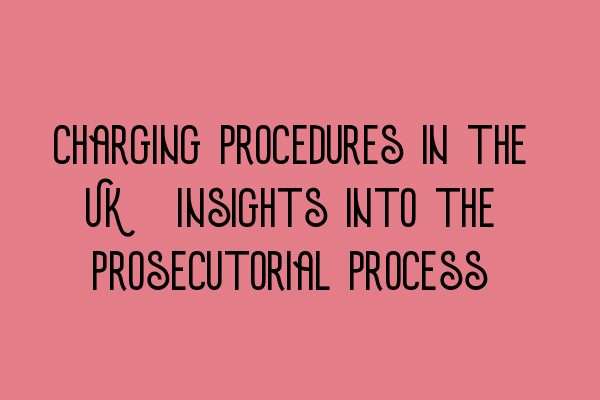Charging Procedures in the UK: Insights into the Prosecutorial Process
Welcome to SQE Criminal Law & Practice Law UK, where we provide expert legal knowledge and insights into various aspects of criminal law. In this article, we will delve into the charging procedures in the UK and provide you with a comprehensive understanding of the prosecutorial process.
What are Charging Procedures?
In the UK, charging procedures refer to the process by which individuals suspected of committing a criminal offense are formally charged. This process involves the Crown Prosecution Service (CPS) or relevant prosecuting authorities carefully examining the evidence and determining whether there is sufficient grounds to proceed with a criminal prosecution.
It is important to note that the charging decision rests solely with the CPS and is based on the two-fold test of the evidential stage and the public interest stage. At the evidential stage, the prosecutor must assess whether there is enough evidence to provide a realistic prospect of conviction. If the evidential stage is met, the prosecutor will then consider whether it is in the public interest to bring about a criminal prosecution.
The CPS works closely with law enforcement agencies, such as the police, to gather all relevant evidence and ensure a fair and thorough assessment of each case. Once the charging decision is made, the suspect will be informed of the charges they are facing and the next steps in the legal process.
The Prosecutorial Process
When a suspect is charged with a criminal offense, they will be brought before a court where the charges will be read out and an initial plea will be entered. This is the starting point of the legal proceedings, and the defendant will have the opportunity to seek legal representation or legal aid if required.
Following the initial court appearance, the case will progress through various stages, including case preparation, pre-trial hearings, and potentially a trial. Throughout these stages, both the defense and the prosecution will have the opportunity to present arguments, challenge evidence, and cross-examine witnesses.
It is crucial to understand that the burden of proof lies with the prosecution, who must prove the defendant’s guilt beyond a reasonable doubt. This means that the prosecution must present strong and convincing evidence to secure a conviction.
As legal professionals, we at SQE Criminal Law & Practice Law UK understand the intricacies and complexities of the prosecutorial process. Our team of experienced solicitors is well-versed in handling criminal cases and can provide expert guidance and representation at every stage of the legal proceedings, ensuring the best possible outcome for our clients.
Related Resources
For those preparing for their SQE exams or seeking further insight into criminal law and practice, we recommend the following resources:
- SQE 1 Practice Exam Questions
- SQE 1 Practice Mocks FLK1 FLK2
- SQE 2 Preparation Courses
- SQE 1 Preparation Courses
- SRA SQE Exam Dates
These resources will provide you with valuable study materials, practice exams, and information on the upcoming SQE exams. We highly recommend utilizing them to enhance your understanding and preparation for criminal law and practice.
Conclusion
Charging procedures are a fundamental aspect of the UK’s prosecutorial process. It is an intricate system that aims to ensure fairness, justice, and the protection of individual rights. Understanding the charging procedures and the prosecutorial process is crucial for both legal professionals and those seeking to expand their knowledge of criminal law.
At SQE Criminal Law & Practice Law UK, we are committed to providing invaluable insights and resources to help you navigate the world of criminal law. Whether you are a law student, a legal professional, or an individual interested in the intricacies of the legal system, we are here to support you every step of the way.
For further information, guidance, or professional assistance, please do not hesitate to contact us. Our team of solicitors is ready to assist you with your legal needs.
